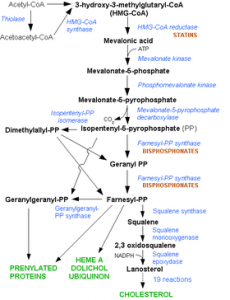Statins, Platelets and Impact-R
Thursday, December 15th, 2011Statins are a class of drugs that lower blood cholesterol by inhibiting the enzyme HMG-CoA reductase. This enzyme, found in the liver, plays an important role in the production of cholesterol. It reduces HMG-CoA to mevalonate, and this conversion is the rate-limiting step in cholesterol biosynthesis.
Statins act by competitive inhibition of HMG-CoA reductase since the statins are molecularly similar to HMG-CoA. Statins are used to lower cholesterol levels in patients who have tried diet and lifestyle modifications but still have high levels of cholesterol.
Medical use of statins is to decrease mortality in patients with preexisting cardiovascular disease and those who are high-risk for developing heart disease. Researchers propose four mechanisms for reduced cardiovascular events in patients taking statins:
- Improve endothelial function
- Modulate inflammatory responses
- Maintain plaque stability (in atheromas)
- Prevent thrombus formation
It is the 4th mechanism that is the subject of a study by Matetzky, et.al., which examined the effects of statins on platelet adhesion and aggregation. This study utilized the IMPACT-R to determine aggregate size and surface coverage of platelets taken from hypercholesterolemic and STEMI (ST-elevation myocardial infarction) patients treated with statins as compared to patients not treated with statins. An abstract of the study can be found here.
